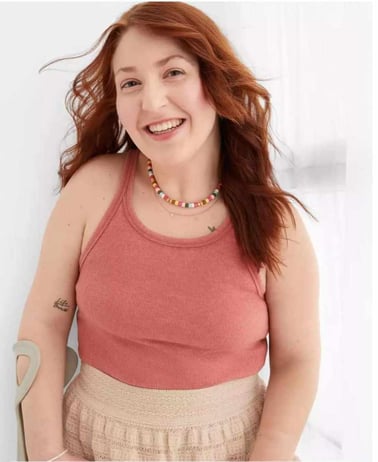Learning Interdependence As a Disabled Woman
Join Our Movement
What started as an idea has become a national movement. With your support, we can influence policy and inspire lasting change.
Become an Advocate
Growing up with a visible disability, I always knew I couldn’t be independent. I did everything right according to the rehabilitative model of disability; I had speech, occupational, and physical therapies. I ran, took swimming lessons, and spent hours putting on a single sock. But I still needed assistance completing daily tasks. I believed I wasn’t trying hard enough because others with my disability were more independent.
My reliance on others was the scarlet letter I was given by a society that determined the value of a disabled person based on their ability to conform to nondisabled standards. This may seem like an exaggeration, but it was how I was treated from an early age.
When I was in kindergarten, I went on a field trip to my local elementary school. To my knowledge, no other kindergarteners took this trip. I went up and down multiple flights of stairs, opened heavy doors, and walked the hallways. Afterwards, I was so exhausted I fell asleep at my desk. Unbeknownst to me, this trip was designed to prove the school was too large, that I was “too disabled.” I realized then that I couldn’t show weakness.
My mother fought for me to attend my designated elementary school that my sister and friends attended. But the fight didn’t end there. The school continued to give me and my parents a hard time. The minibus driver refused to take my walker on the bus, claiming it was a safety hazard. Eventually, my mom contacted the school board, who demanded my walker go on the bus. Then, my PT started claiming I had ADHD, arguing that I should attend a smaller school (mind you, there were plenty of able-bodied students with ADHD that went there). My PT, principal, and teacher hounded my parents to transfer me to the school for “kids like [me].” Despite this, I completed the year at my designated elementary school.
I don’t share these experiences to garner sympathy; I do it to illustrate how pervasive ableism is and why I’m glad that the next generation of disabled kids talks more freely about interdependence. When I cried at EmpowHer Camp for needing help, I was the same little girl who was taught that she needed to prove she could go to elementary school with her friends. My hope is that the next generation of disabled people will grow up knowing what interdependence is and why it’s vital.
Erica Mones is a writer, YouTuber, and Disability Studies graduate student with cerebral palsy.
